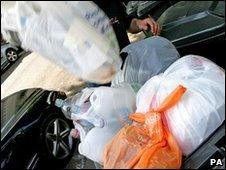Government rules out 'pay as you throw' waste charges
- Published

A reward scheme is being pioneered by Windsor and Maidenhead council
"Pay as you throw" charges for household waste have been ruled out by Communities Secretary Eric Pickles.
Plans to let English councils pilot schemes which would charge or reward people according to the waste thrown out had been drawn up by Labour.
But councils shunned the trials, aimed at cutting landfill, and Mr Pickles said the government backed rewarding people for recycling instead.
Labour said it should be up to councils to choose how to collect waste.
The UK must reduce the amount of waste sent to landfill by nearly two-thirds by 2020 to meet EU targets.
'Bin tax'
Labour had proposed giving households which recycled the most rubbish and left the least in their bin a rebate, while charging those who put out the most non-recycled rubbish.
Powers to allow five councils in England to trial the scheme from April 2009 were included in the Climate Change Act - but none applied, saying they had not been told how it would operate.
Critics said the "bin tax" idea could encourage fly-tipping and prompt people to burn rubbish at home.
Mr Pickles has effectively ruled out a charging scheme, instead backing a recycling reward scheme pioneered by Windsor and Maidenhead council in Berkshire.
Households in the borough - which Mr Pickles visited on Monday to draw attention to the scheme - are being awarded points for the amount they recycle, which can be redeemed at shops, restaurants and leisure centres, or donated to schools.
Mr Pickles said the scheme had increased recycling by 35% and an incentive-based approach was more effective than taxes or fines in reducing the amount of rubbish sent to landfill sites.
"You should treat people with respect instead of having a bunch of bin inspectors, bin police," Mr Pickles told BBC Radio 4's The World at One.
Incentivising people was the quickest way to increase recycling levels, which he said would be badly needed if the UK was to meet its target of becoming "one of the green economies of Europe".
"It does not put the costs up," he added. "Actually what it does is it increases the recycling rate and puts money into the local economy."
Windsor and Maidenhead council is inviting more than 60,000 households to join its RecycleBank service from Monday.
Environmental impact
Councillor Liam Maxwell said: "Paying the public to recycle works. It increases recycling rates, reduces our environmental impact, reduces council tax and helps local businesses.
"The results of our trial with 6,000 local homes far exceeded our expectations."
Shadow Environment Secretary Hilary Benn said it was untrue that Labour wanted to force councils to charge households for excessive waste.
"It should be for local councils to decide how best to collect waste and increase recycling but everyone knows we need to send much less to landfill.
"That's why the big question is - will the coalition support Labour's plan to stop certain materials from going to landfill in future."
And consultants who advised the Labour government on its plans said evidence from other countries indicated people were not opposed to "pay as you throw".
"The evidence is mostly very positive in terms of encouraging households to recycle more, reducing the amount of waste they generate and, importantly, reducing the overall cost of the service to the people who are using it," said Dominic Hogg, from Eunomia Research and Consulting.
And he suggested the new government's policy did not address the central problem.
"There is not an incentive for households to reduce the waste they generate in the first place, only to recycle more."
Pay-as-you-throw is still being considered in Wales, but there are no plans for it in Scotland and Northern Ireland.